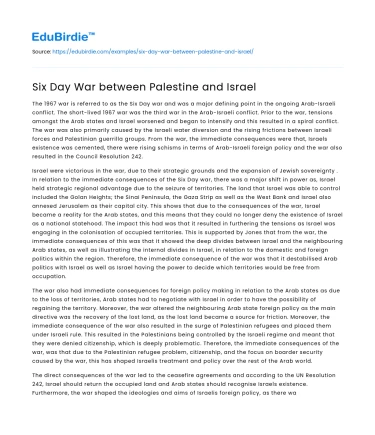The 1967 war is referred to as the Six Day war and was a major defining point in the ongoing Arab-Israeli conflict. The short-lived 1967 war was the third war in the Arab-Israeli conflict. Prior to the war, tensions amongst the Arab states and Israel worsened and began to intensify and this resulted in a spiral conflict. The war was also primarily caused by the Israeli water diversion and the rising frictions between Israeli forces and Palestinian guerrilla groups. From the war, the immediate consequences were that, Israels existence was cemented, there were rising schisms in terms of Arab-Israeli foreign policy and the war also resulted in the Council Resolution 242.
Israel were victorious in the war, due to their strategic grounds and the expansion of Jewish sovereignty . In relation to the immediate consequences of the Six Day war, there was a major shift in power as, Israel held strategic regional advantage due to the seizure of territories. The land that Israel was able to control included the Golan Heights; the Sinai Peninsula, the Gaza Strip as well as the West Bank and Israel also annexed Jerusalem as their capital city. This shows that due to the consequences of the war, Israel became a reality for the Arab states, and this means that they could no longer deny the existence of Israel as a national statehood. The impact this had was that it resulted in furthering the tensions as Israel was engaging in the colonisation of occupied territories. This is supported by Jones that from the war, the immediate consequences of this was that it showed the deep divides between Israel and the neighbouring Arab states, as well as illustrating the internal divides in Israel, in relation to the domestic and foreign politics within the region. Therefore, the immediate consequence of the war was that it destabilised Arab politics with Israel as well as Israel having the power to decide which territories would be free from occupation.
Save your time!
We can take care of your essay
- Proper editing and formatting
- Free revision, title page, and bibliography
- Flexible prices and money-back guarantee
The war also had immediate consequences for foreign policy making in relation to the Arab states as due to the loss of territories, Arab states had to negotiate with Israel in order to have the possibility of regaining the territory. Moreover, the war altered the neighbouring Arab state foreign policy as the main directive was the recovery of the lost land, as the lost land became a source for friction. Moreover, the immediate consequence of the war also resulted in the surge of Palestinian refugees and placed them under Israeli rule. This resulted in the Palestinians being controlled by the Israeli regime and meant that they were denied citizenship, which is deeply problematic. Therefore, the immediate consequences of the war, was that due to the Palestinian refugee problem, citizenship, and the focus on boarder security caused by the war, this has shaped Israelis treatment and policy over the rest of the Arab world.
The direct consequences of the war led to the ceasefire agreements and according to the UN Resolution 242, Israel should return the occupied land and Arab states should recognise Israels existence. Furthermore, the war shaped the ideologies and aims of Israelis foreign policy, as there was a key focus on determining the physical border lines of the Jewish state, and this meant that Zionism was not the main aim. Moreover, Israel was able to retain the Golan Heights and the West Bank, and this ensured boarder security and allowed for the military to be on the ground. Another consequence of the war was that Israeli and US relations strengthened as Israel became a recognised power. Therefore, the consequence of the war led to the UN Resolution, and this was the basis for future Israeli-Arab negotiations.
To conclude, I am of the view that the war was hugely problematic as it resulted in the rising tensions between Israel and the Arab states, which meant that both regional actors were under surveillance in terms of army mobilisation. This implies that both powers were on the pre-emptive defence and the immediate consequences of this, is that it leads to heightened confrontation and escalates the conflict. Furthermore, the immediate consequences of the war were that there was a need to assert the borders to ensure national security for Israel and we can see that the war largely dictated Israels foreign and domestic policy. Therefore, I believe that the war had catastrophic consequences for the Middle East due to the huge loss of life and added to the existing Palestinian refugee problem.






 Stuck on your essay?
Stuck on your essay?

